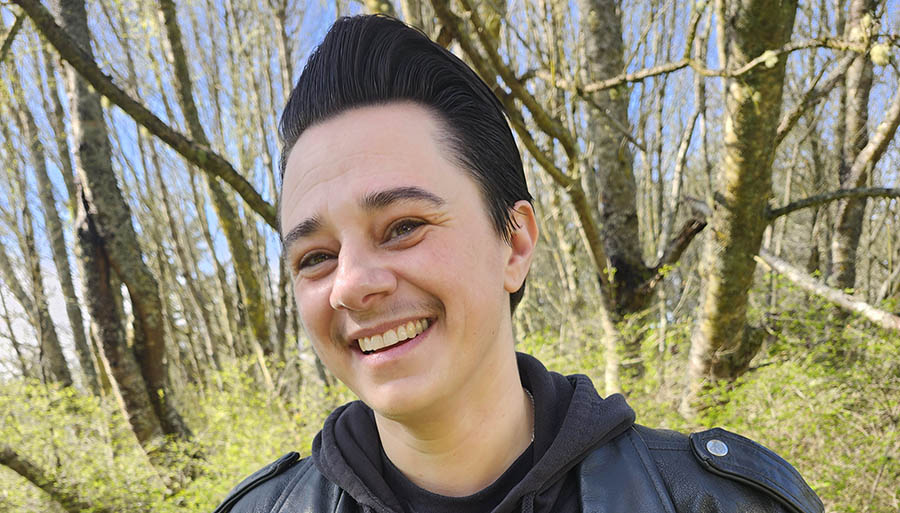Things have changed on Bainbridge Island. Certainly, home prices. But Viktor Volkov who grew up here and recently returned with children of his own finds that opportunity, community values, and the idylls of free-range childhood persist.
Like kids in small towns across America, Viktor Volkov and his Bainbridge friends used to hang out at a convenience store, playing video games and eating junk. The owner, whose son later took over the business and named it Walt’s, “basically raised all of us kids,” he recalls. Some days they’d run over to Fort Ward where a few friends lived or explore the beaches, “just a pack of kids roaming the island, having fun.”
Viktor left Bainbridge at the age of 12 when his parents, a Montessori preschool teacher and the owner of a small construction company on the island, could no longer afford the taxes on the home they had purchased in the 80s, when a house on an acre of land with views of Rainier could be had for $120,000. In his new hometown of Port Ludlow, the roads were highways, and the kids did not live nearby.
Last June, the day Viktor moved into HRB’s Island Home with his daughter and two sons, the kids in this cozy neighborhood of five duplexes appeared at their door with an invitation to play. Viktor and his family had just returned to the United States after a decade living in the Czech Republic, where his children had struggled to be accepted. And just like that, as it was back in the day, “best friends” were made.
Viktor’s return to the island was more than a nostalgia-filled homecoming. It was a matter of escape, survival, and the opportunity to start over. He was fleeing an abusive relationship, one which also prevented him from claiming his true gender identity. Soon after arriving, Viktor, who was assigned female at birth, began his transition. “I felt like I was going to just die over there. I don’t feel like that now. I feel safe. I feel good.”
Viktor and his family arrived on Bainbridge with just “four suitcases to our name,” difficult circumstances from which to begin anew, but the community rallied to help. He was connected to HRB by an old friend whose sister had lived in an HRB apartment, and the mother of his high school sweetheart put the word out on social media, eliciting donations of clothing and enough furniture for virtually the entire apartment. Viktor was delighted, but not entirely surprised.
“There’s just a sense of identity on Bainbridge, of looking out for one another,” he says. “There’s a lot of care in the community, maybe because we’re an island and we’re separated from the mainland. That insulates us and creates this idea of community, which can be harder to achieve in areas with sprawl and disconnected rural areas.”
So what will he do with his newfound safety and housing stability? A long-time writer, Viktor completed a seven-volume urban fantasy novel, and after connecting with fellow writers at BARN, has reason to be “cautiously optimistic” about finding an agent and ultimately a publisher. He’s now at work on a novella, a modern twist on the spaghetti Western featuring a romance between a trans man and a cowboy—and a demonstration of his commitment to increasing trans representation in literature.
Viktor has an entrepreneurial past and a knack for reinvention. He launched two record labels with his high school boyfriend, shutting them down when they split up and the recording industry moved away from CDs. Soon after, he switched to book publishing, pulling books written in old Norse and English from the public domain, translating them into a more accessible English, and releasing them through an Amazon print-on-demand service. Fifteen years later, he continues this work, but competition from AI has made it less profitable and so he is preparing for a career as a commercial editor. Viktor has an AAS in marketing and graphic design and is finishing up an online bachelor’s program in English and professional writing from Central Washington University, where he also works on the school journal.
Viktor also serves on the HRB board, where he appreciates the opportunity to advocate for low-income members of the community and for a more inclusive Bainbridge. He loves this community, while acknowledging that much about the old Bainbridge, that of his childhood in Point White and his young adulthood when he lived with his boyfriend and with his boyfriend’s mother in a $500/month rental on Ferncliff Ave, has been lost. He recalls a more vibrant music and youth culture, when the island played host to myriad teen bands and older punk rockers, and knows many people his age, who’ve either had to move away or continue to live with their parents so they can stay on the island they love. Viktor feels a pang each time he meets someone who serves this community but cannot afford to live here and therefore cannot reap its benefits—just recently a school administrator and the police department employee who took his fingerprints so that he could volunteer in his children’s classroom. He wants there to be a place for these people and all those who animate and strengthen this community through their work and volunteerism, their island histories and expansive worldviews, be they a spunky kid, a Gen Y mom, or wizened punk rocker.
